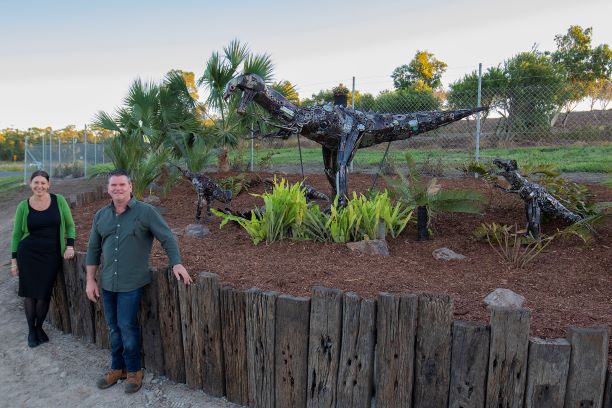Council’s dinosaur Place Making installation welcomes new additions to its prehistoric family!

It’s the new age of dinosaurs! There has been a buzz of excitement around the entrance of Yeppoon landfill recently, as the popular art installation welcomes new additions to its dinosaur family.
Local builder and artist Steve Ross was commissioned by Council to create four new pieces to complement the existing sculpture, to provide a distinctive entry to the landfill while also creatively informing the community about the landfill’s important role in minimising and reprogramming waste.
The installation has been funded as part of Councils ongoing Place Making Programme.
Made from discarded metals foraged from a variety of sources such as old car parts, tools, machinery and even golf clubs, the new pieces include three smaller Australovenators and an innovative nest of dinosaur eggs.
Steve said he was thrilled by the positive response his Jurassic-themed work had already received since it was installed recently.
“It was a challenge to build these new pieces; because they are smaller, I had to find a different suite of parts to put them together, so just as much labour goes into them, but I’ve tried to keep them looking as similar as I can,” Steve explained.
“Each piece weighs about 100kg to 150kg and took well over 400 hours to build. I enjoy building them because rather than being hidden in someone’s home, the public gets to see and enjoy them, especially the kids who love dinosaurs.”
Portfolio holder of Vibrant Community (Tourism, Events and Culture), Councillor Tanya Lynch said Steve’s impressive and intricate works, as well as the many other wonderful Place Making initiatives found across the Shire, had undoubtedly enhanced the unique charm of our region.
“Place Making has positively benefitted our Shire, not only by showcasing the wonderful local talent we have here but also by creating welcoming, educational, interactive and visually appealing spaces for visitors and residents to enjoy,” Cr Lynch said.
“The dinosaurs are not the only recycled component of the installation. The concrete slabs and mulch were sourced from the landfill. The railway sleepers and rocks were salvaged from other work sites. The landscaping has been re-purposed from multiple locations and have been selected to present a vegetated backdrop similar to what might have occurred during the time these dinosaurs roamed the earth. To top it off, the site is being irrigated with effluent water.
“Overall this is a fantastic combined effort between several Council teams, highlighting how we can all be more creative and environmentally responsible at the same time.”
Cr Lynch added there were more Place Making projects underway in the Shire including sculptures and landscaping initiatives.
DINO FUN FACTS
The original sculpture was modelled on an approximate life-sized interpretation of a carnivorous Australian dinosaur known as the Austalovenator, meaning “southern hunter”.
The Australovenator was a significant find in Australian paleontological history, being the most complete predatory dinosaur so far discovered in Australia. The fossilised remains of the Australovenator were found relatively recently, being scientifically described only in 2009.
It was found approximately 60km northwest of Winton in a geological layer called the Winton Formation that dates from the Late Cretaceous period, about 95 million years ago.
LANDFILL STATS
- All metals coming into the Landfill are directed to the Metals Stockpile.
- Over 228 tonnes can go through the Landfill site each year.
- All green waste is mulched onsite and sold to the public. Close to 3206 tonnes of Green Waste is disposed of each year.
- Concrete and Asphalt is crushed and then used onsite for operational matters. Approximately 775 tonnes can enter the Landfill each year.
- All General Waste from Kerbside Collection bins and General Waste collected from Transfer Station bins are emptied at the Landfill Face where it is compacted and buried. Once buried, nothing can be recovered. Together, General Waste can create over 10,000 tonnes a year.